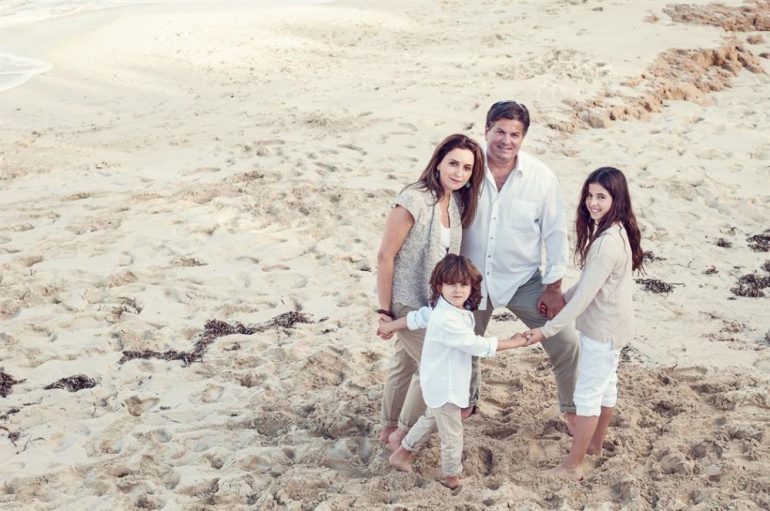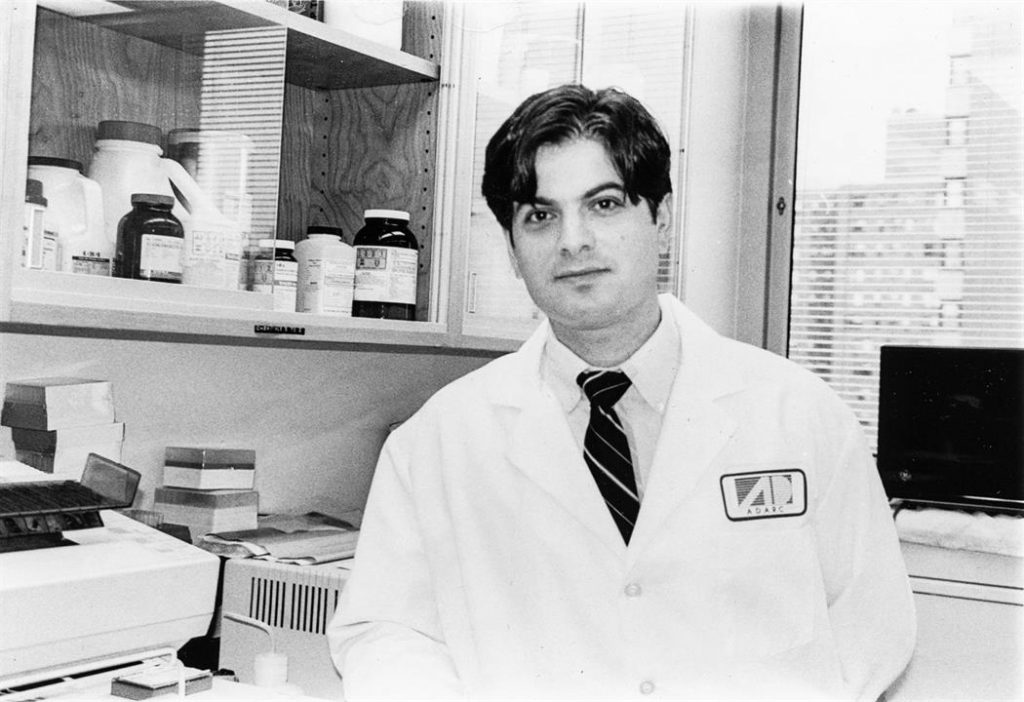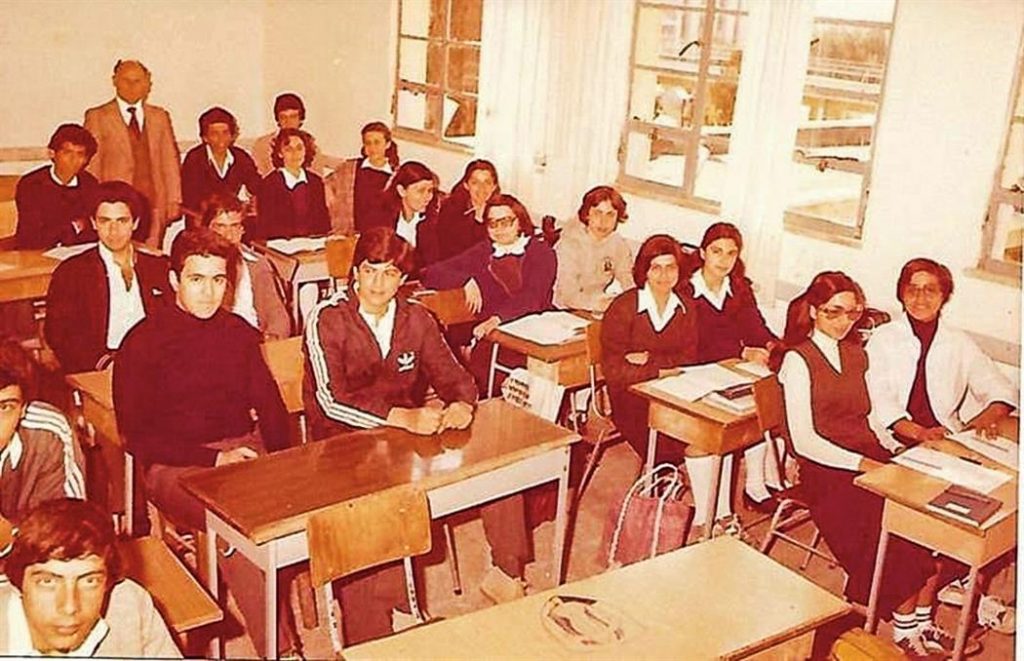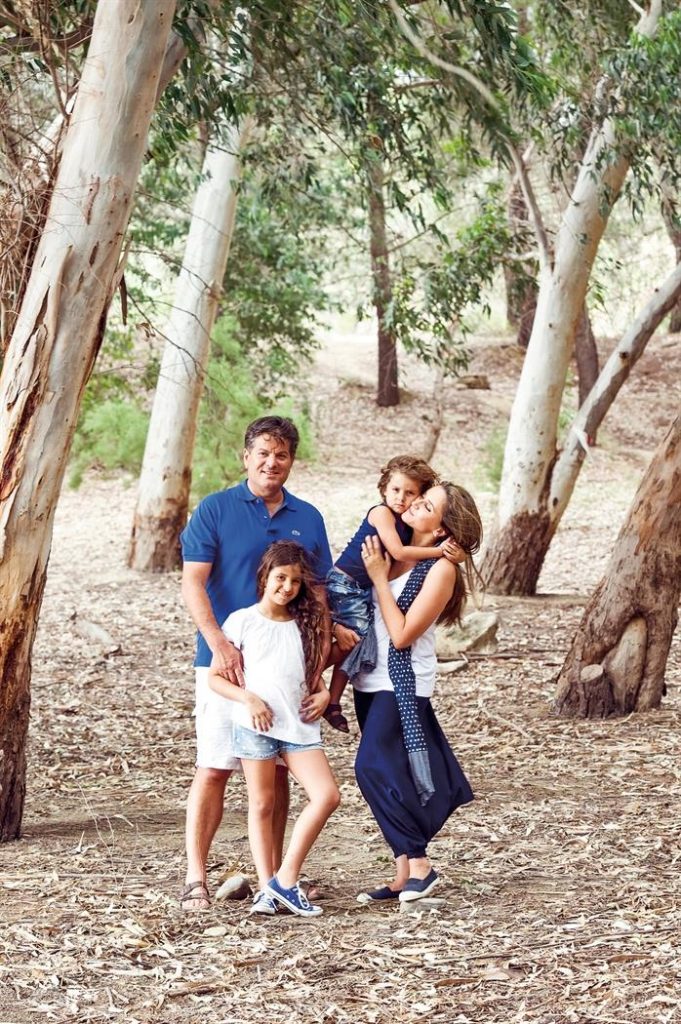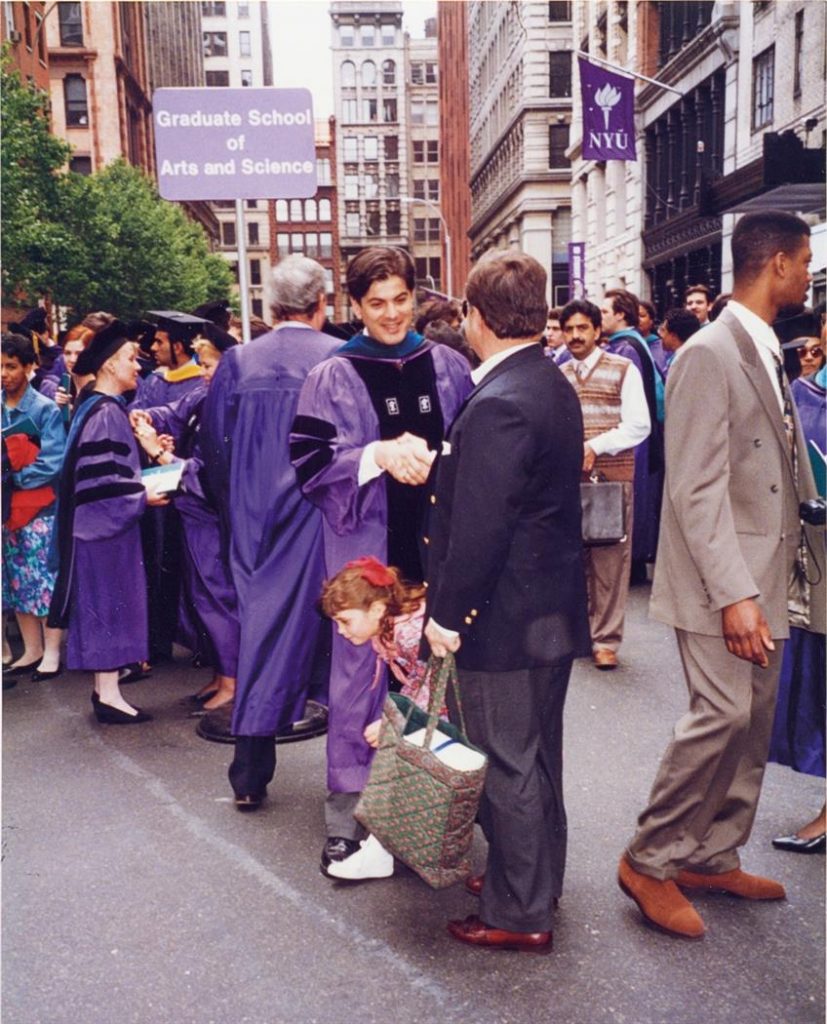The man behind the scientist, who in the last two months has become an integral part of her daily life. The childhood memories of Assia, the refugee, the years in America, the research and successes for AIDS, the return to Cyprus, his family and the reason he wants to live and die on a boat at sea.
Leontios Kostrikis, a professor and member of the scientific team that advises the President of the Republic, Nikos Anastasiadis, on the coronation, unfolds unknown aspects of his life to journalist Thanassis Fotiou and Down Town magazine.
The biography of Leontios Kostrikis is about 50 pages. Many university parchments, publications, awards… Some of them are well known, but many more are not. The truth, of course, is that when a few days before Easter - an "ordinary" day of the new daily routine, a job under restrictive measures for you, for him another stressful day in his new post office on the horizon - the telephone Exactly 11:20, what I had in mind was to "discover" the man behind the scientist.
Do you have any memories from Assia?
Of course I have. Intense, in fact. I lived there until the fifth grade of the public. When the city became 11 years old, I was born in '63, so I remember a lot.
So what images do you recall in your memory when you look back on those years?
The images that come to his mind are all positive. Years of carelessness. Pictures from the games µ to his friends στα in the fields… Th…µµaµ that I didn't have µpalas or λλονalso that the µpaleas I had Εθν the National Asian gave them the spassies-were never spherical, round, so they put no one under them. straighten, otherwise when it hit the ground σε it could go in any unpredictable direction…
Is the family affluent, poor?
Assia was a predominantly rural village in Mesaoria. I come from a normal family of the middle class of the villages. His father worked for the Water Development Company and his mother was a housewife. His parents, who were not university graduates, were not in a literate environment. However, both of his parents, Yorkis and Anna, had a great understanding of their importance.
Which of the two contributed the most to your character?
Both in a different way. His father was the man who first taught him the values of dignity and justice. He is always remembered as an extremely just man. He told us that when you have something to share or separate with someone, always find the right line and then pull it a little towards you to be sure that you will not laugh at the other. Prefer, he said, to have less of you, in your knowledge, to be sure that you did not take from the other's share. I confess that when they were small I considered all these strictures that were not of great value. Also, let him learn to forgive people. And twice. The third time, he said, let's be strict. This is what your father taught you. The Mother of God gave me to understand the value of letters. And this is because she wanted what her children could not do, her children could do. As I was told, she was an excellent teacher at school, but in those years in the villages, women were not sent to study. The purpose was to get married as soon as they finished school. Letters were not considered a priority. And he had this complaint. Remember that he told me, whatever you do in your life, to study. And where he delivered it. And then, when they said to study, they did not just mean to learn letters, but to provoke and excel.
So what else do you remember from Asia?
The people of Asia had the same rigor and dignity. It was very important for them. Better a poor horse than no horse at all. And any retsinia lasted for many generations. I had heard them say that someone's great-grandfather was a thief. What do you expect from him, they said, his grandfather did this and that; I do not hide from you that this for you was a privilege but also an exceptional difficulty for evolution.
That is? How exactly did it bother you?
The whole philosophy of evolution lies in the fact that you make random mistakes and one mistake will be beneficial. So, being afraid to make a mistake didn't work.
The years you lived in Asia were also politically charged years, right?
Yes. Political separatists were also a strong figure in Asia. The upper Pshalas was on the right and a few richer, the lower Pshalas was on the left and less rich. I come from a right-wing family, whose father was also an old football player of Ethnikos Assias and I remember going to the scout and they put him to shout Greece-Cyprus-Union and George Grivas Digenis. And as I passed by, they made me shout loudly outside the cafes on the left. All this bothered you. It took me many years to eliminate them. To have a more objective perception of things and of his own appreciation of history and people.
Where did the invasion find you?
First of all, remember the coup. I remember the fellow villagers of EOKA B who dressed in military uniforms, turned the village around and put the corpse in a coffin. Remember when the door slammed shut, I opened it and there were five or six of them. They asked for his father and at some point I heard him tell them, if you are a jerk, come and arrest me. Because his father, even though he was a nationalist - he said, I had never heard him say right - was against EOKA B and blamed them in the cafe. This must have been done a couple of months before the invasion. Then I woke up and saw the planes, I remember them as if they were yesterday. Assia was bombed during the second invasion and then occupied. The noise of the planes at the time of the sinking and the bombardment of the village, I remember him still. Possibly, a strong sensitivity to noise has been around ever since. The worst thing you can do to them is make a loud noise behind them. It upsets me a lot. He left Assia on August 14, around two and a quarter, while the tanks were entering the village. He was found in Xylotypos under a monster, which he later shared with another family.
And you ended up, as far as I know, in Leisso.
Yes, his father was appointed to the city's Water Development Agency and ended up in Leisso. Later, however, I left with 30 other Cypriots for Athens College, Greece. I returned two years later, graduated from Lanitio High School, and did my military service during my tenure. There I discovered that you are a man of water. I was a sailor in his youth, today I train his son. ∆I can't live without contact θάλασσαin the sea…
I read that the most important thing in your career was a Fulbright Scholar Scholarship…
Yes and I will explain why. While in the army, someone told him about the Fulbright Scholarships. I applied, went for an interview and was given a scholarship. I was accepted to many schools in America, one of which was New York University. I don't know how and why a village boy from Asia had a strong desire to go to New York, perhaps because of the cinema, so seeing that I was accepted by the NYU, I decided to go there. So, with a ticket that was cut by his father and $ 350 that he gave me in his pocket - I remember, because it was the most time I had ever caught in his life - I arrived in America. New York was an extremely pleasant surprise for you. I quickly became accustomed, I felt incredibly familiar from the beginning, I easily adopted her culture, her friends who were all Americans, her first roommate was the then famous actress Adam Sandler That scholarship happened, if you consider that it was a very expensive university - then it was around 40 thousand dollars a year and I had the opportunity to study there for four years for free! It was the most valuable start!
How did you get to work with the great David Ho?
When I finished my Ph.D. in 1993, Irene Diamond was given a $ 250 million donation by the Aaron Diamond AIDS Research Center, founded by her husband, led by David Ho-Taiwanese, American - so what's better than doing a postdoctoral research there, especially at a time when there was this new virus that plagued the world, HIV. David Howe was a celebrity, a gifted personality, in 1996 he was named Man of the Year by Time magazine, he was the man who brought science back to the forefront, he was the personal physician of Magic Johnson and many other celebrities and they enjoyed the fame of a Hollywood star himself. I had an amazing relationship and collaboration and had published a lot of paper together, while they were at the Aaron Diamond AIDS Research Center. Then he helped me and I became an assistant professor at Rockefeller University, one of the best medical universities in the world - Aaron Diamond is part of Rockefeller University - and he also helped me set up my own workshop. His first reports were about the importance of human genes in HIV transmission and the development of AIDS. It was then that he discovered that there is the polymorphism in a gene called CCR5 which, when you are the gambler in this polymorphism, is completely protected from HIV infection. This was also her first "great" success.
I guess it was one of the reasons you were honored in the following years, for achievements that contributed to the improvement of the world?
You are referring to a remarkable distinction from the J. Williams Fulbright Commission to old scholarship holders, which took place in 2005 and I was delighted to be one of the 40 selected among 250.000 of the 140 countries that had won scholarships since 1946.
What is not widely known is that by the mid-90s you had come to Cyprus ζί along with David Ho κυβέρνηση and signed a government agreement to allow Cyprus to begin the pioneering treatment invented by David Ho for AIDS.
This was done in 1996 and was the result of the actions of Myrna Dimitrios Pattihis, who was President of the Grigoriou Clinic as well as Mrs. Fryni Venardi, President of the Foundation. He had searched for the discoveries in the Americas and David Ho's innovative methodologies, was informed of a call he had made, and David Ho agreed to make the trip, so in August 1996 he came to Cyprus. Manolis Christofidis was then Minister of Health and the result of that trip was to begin in Cyprus the administration of the modern antiretroviral drug that David Ho invented and to start saving lives from death. Cyprus then became one of the first countries to initiate David Ho's innovative education.
In addition to HIV, have you been involved in the emergence of SARS in those years?
Yes, in America, in addition to David Ho, I had met a man who became important in his life. A lady named Patti Birch. A wealthy Jewish woman, a pioneer and collector of works of art and a great philanthropist, whom I met when she was 80 years old, through her partner and later her husband. Patti has helped me a lot in his career, he has made a lot of use of this opportunity to help me research his research. So Patti then asked me to stop what I was doing and get involved with SARS. So, I stopped what I was doing and went to Toronto to live. There, I developed a new diagnostic method that became a patent in the Americas, but without completing it, the epidemic ended. Based on this patent, which concerns an easy-to-replace virus diagnostic methodology, I have now developed a new diagnostic and this methodology is one of the 12 best in the world and is being evaluated by the World Health Organization.
Really, why did you return to Cyprus? Why would anyone leave such a course in the Americas to return to a small island somewhere in the Mediterranean?
I lived in New York from the age of 20 until I was 40. I have always been homesick, I always wanted to return to Cyprus. Ius's wife also wanted to return to Paris to do her doctorate - Nadia is of French-origin, Psarokin origin. So, since it would cross the Atlantic anyway and given that neither of you wanted to break up your bond, you finally decided - once I had the chance - to come to Cyprus - to come to Cyprus.
Did the climate count, given that you are a man of water as you told him before?
Very clearly. You are in love with the weather in Cyprus. Now, get involved in sailing again, training your ten-year-old son. Every Sunday sail in Larnaca. Wait for it all to end so we can come back. And to my wife I used to say that when I retire, I want nothing more, no houses, nothing, except a boat, a sailboat. To live, to sleep and to die on a boat. And I mean it. It's not funny. It is a serious desire of His.
Seventeen years now in Cyprus, didn't you miss America?
Yes, the truth is, I miss him. I would say that I have not yet fully adapted to Cyprus, strange as it may sound. I have difficulties, not in his personal life, in the professional life. There are so many things wrong that I can't identify with. In Cyprus, Fertility prevails. I try to cling to this mentality, but it is extremely difficult. There are, of course, great professions and I have some great friendships, but it's not the majority.
Are your friends people in your circle, scientists, teachers?
No relationship. He is out of college. I have a group of friends in Paphos, who are simply fishermen and people of the sea. I have a great love for ordinary people. The best thing for him is to get up at 4-5 in the morning, to walk in nature, to swim, to cook φίλους to his friends µ to eat, to say simple things…
Apart from the sea, what other interests do you have, how do you fill your batteries?
Look, there's something great about you and your wife that sometimes makes you laugh and make fun of you. It takes time to think. You may see me sitting and staring at the horizon or the ceiling. I have a great need for thought. Many times I do it when I drive. The inspirations I have are either very early in the morning, when I wake up, or at night when I relax before I go to sleep. I always wake up very early in the morning, around four, and I also wake up very early, around nine.
How would you describe yourself in general terms?
You are a simple person. You don't like a lot. It irritates me to keep a lot of things. That is, if I have five, I will buy one and buy a sixth, I will find a way to get rid of one. They are not fascinated by the new, modern cars, they like the old ones µ
As a father, how are you?
I have a fifteen-year-old daughter and a ten-year-old son. Together with his wife, I developed a very cool relationship with your children. More friends than parents. I talk, I don't impose on them. As no one has imposed on You, neither will I impose on them. Sofia is an excellent artist, she paints amazingly. Yannis has a more scientific mind. They have the same freedoms that their father and father have. You are equal. And they will follow whatever they want in their lives.
How do you manage the publicity of the days?
This is something that has been difficult for me lately. I always enjoyed it and wanted to be anonymous ξύ among anonymous…
It's hard these days µ
It's not something that pleases you. I am not afraid to go out στά in front and I dare to say στά in front, even if I eat bullets. But, believe me, when this evil is over, I will disappear.
You said somewhere that Ioto says: "Everything in life should be seen as an opportunity to seek something." What did the current situation tell you?
What I was impressed with was how unprepared the states are to understand and counter a pandemic. And because there will always be pandemics on this planet, it's a good idea to keep the military, infantry and artillery, as well as the right infrastructure and the right staff to protect you from viruses. Just as there are economic crises and there are tools and methodologies for counteracting them, so there must be for pandemics. And you saw how complex and complicated the situation became. Therefore, states should provide budgets so that they are ready for pandemics. There is a lot that needs to be done. And I hope they don't forget when it's all over.
However, it is one of the rare cases where politicians - who are accustomed to deciding on positions they hold, but also on positions they do not hold without the knowledge of experts - have taken a step back, asked to listen to experts and make political decisions based on them. Was it easy to communicate with them?
Look, I'm not a politician. It concerns me, but it does not interfere. Nor do they associate with politicians. And to be honest, I don't understand them either πώς sometimes how they think, if they think. But, I have to admit the following: I was picked up by the President on a phone call, "the President wants to vote for you," they told him. I did not know President Anastasiadis, nor had I ever spoken to him. He asked me very specific questions about the Heat they had to take. I don't want to praise him, but the man did what he was told. Listen to his scientists, who are not only me but also many others. He got painful sprains. And of great importance is the fact that the world has cooperated. And that will save you. You are, of course, still at the beginning of the end, you have to be careful.
As for the specific virus, what will follow? What will you scientists do when you slowly return to your normalcy?
It is extremely important to decode its DNA. I will start in the laboratory where I will genetically decode all the strains of the virus that have been obtained from Cypriot patients, in order to do a Study of Marine Epidemiology. At the same time, I will perfect the diagnostic method that I started years ago in Canada and at the same time I will be involved in the process of oil or medicine. There is a lot of work to be done.
And all this requires funds.
Patti Birch had the insight to invest in SARS 1 research, which I use twenty years later for SARS 2, so somehow they have to be found.
Do you think your life will change after that?
Humanity usually has a short life. What I am saying is that science has been called and answered. Don't forget it. Everyone should be aware of the great importance of research. And to have sufficient funds for science to function continuously, not 0,1% of the budget but 1% and 2%, as developed countries have. You know, the difference is not made by the big numbers, but by the big scientists. Without inputs and funds, no notable person will come to deal with it. In Cyprus, too, great scientists must be able to act and spring up.
After all, what do you think was the role that the Cypriots and the Greeks played in bringing about µ prudence and discipline στά in the face of this difficult situation?
You are a people who raise their glass around the table and say "goodbye" and in their wishes we offer health above all… I believe that this culture, possibly and subconsciously, worked in a remarkable way.
Source: Down Town Magazine
